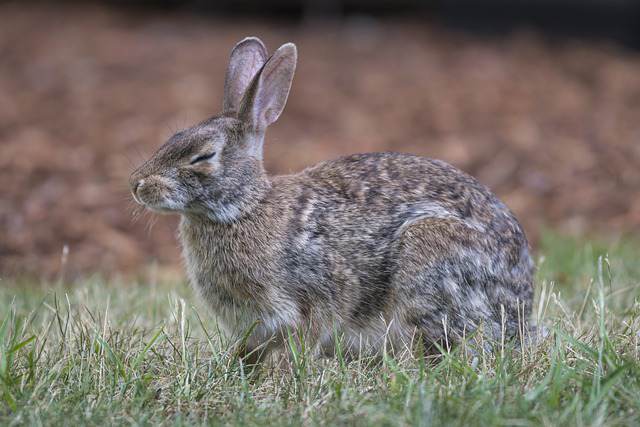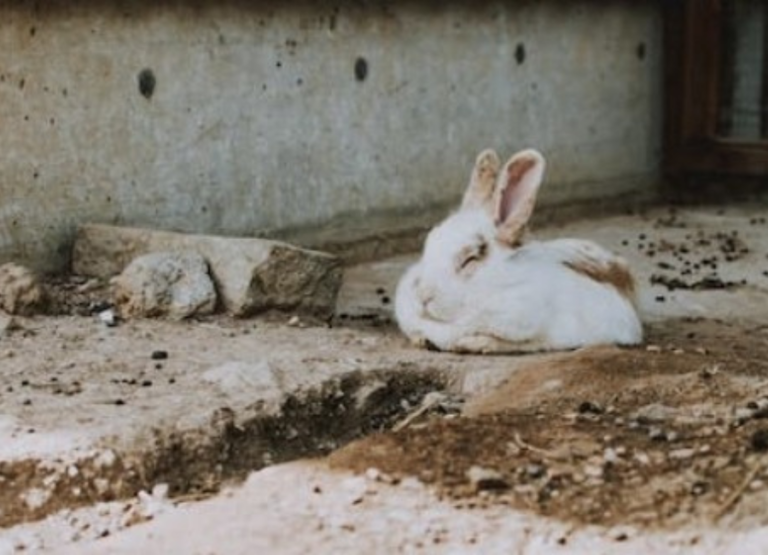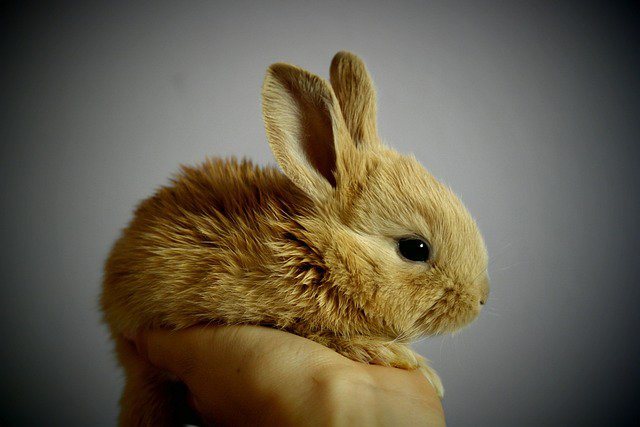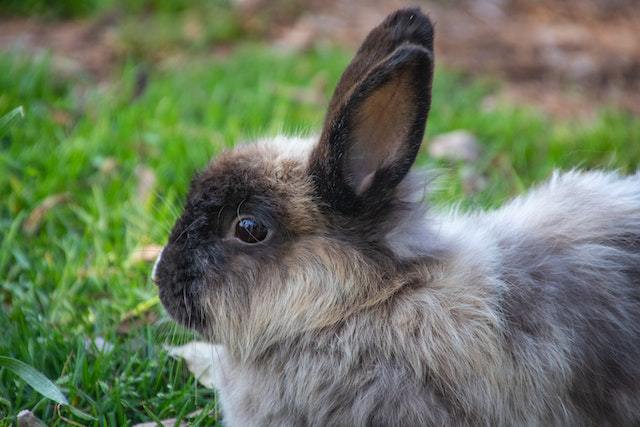15 Common Signs of a Stressed Rabbit With Remedies

Today, let’s dive into a topic that’s close to my heart – signs of a stressed rabbit.
We all want our furry friends to be happy and healthy, so it’s crucial to know the red flags that indicate when our bunnies might be feeling overwhelmed.
In this blog post, we’ll explore three telltale signs that your adorable hopper might be in need of some extra TLC.
Let’s get started…
Causes of Stress in Rabbits
Rabbits can experience stress due to various factors. One common cause is environmental changes, such as moving to a new location or the introduction of new animals.
Lack of proper socialization or companionship can also lead to stress in rabbits. Additionally, loud noises, bright lights, and excessive handling can be stressors for these sensitive creatures.
Changes in their diet or disruptions in their daily routine can also contribute to stress. Lastly, rabbits may experience stress when they feel threatened or unsafe in their surroundings.
Signs of a Stressed Rabbit
The following are some of the most common signs of a stressed rabbit:
1. Altered Eating Habits
A stressed rabbit may exhibit altered eating habits, such as a decrease in appetite or refusal to eat altogether.
Stress can disrupt a rabbit’s normal eating patterns. It can be caused by changes in the environment, diet, or routine, as well as underlying health issues.
To fix altered eating habits in a stressed rabbit, it is important to identify and address the underlying cause of stress.
Provide a calm and quiet environment for the rabbit, ensure a consistent and balanced diet, and consult a veterinarian if necessary.
Read more about why your rabbit is not eating.
2. Reduced Activity
A stressed rabbit may become less active, showing a decrease in movement and playfulness.
Stress can lead to a decrease in a rabbit’s activity level.
It can be caused by factors such as fear, anxiety, illness, or changes in the environment.
To address reduced activity in a stressed rabbit, it is important to create a safe and comfortable environment.
Provide hiding places, toys, and opportunities for exercise. Spend quality time with the rabbit to help alleviate stress and encourage activity.
3. Teeth Grinding
Teeth grinding, also known as bruxism, is a sign of stress in rabbits. It is characterized by the rabbit grinding its teeth together audibly.
Teeth grinding in rabbits can be a response to pain, discomfort, or stress. It can be caused by dental issues, illness, or environmental factors.
If a rabbit is exhibiting teeth grinding, it is important to consult a veterinarian to rule out any underlying health issues.
Addressing the cause of stress and providing appropriate dental care can help alleviate teeth grinding in rabbits.
4. Excessive Grooming
A stressed rabbit may engage in excessive grooming, leading to fur loss, skin irritation, or even self-injury.
Excessive grooming in rabbits can be a response to stress, boredom, or discomfort. It can also be a sign of underlying health issues.
To address excessive grooming in a stressed rabbit, it is important to identify and address the underlying cause of stress.
Provide environmental enrichment, such as toys and hiding places, to alleviate boredom. Ensure the rabbit’s living environment is clean and comfortable.
If necessary, consult a veterinarian to rule out any underlying health issues and provide appropriate treatment.
5. Aggressive Behavior
Stressed rabbits may exhibit aggressive behavior, such as biting, scratching, or lunging. This behavior is often a result of fear or feeling threatened.
To address aggressive behavior in a stressed rabbit, it’s important to create a calm and safe environment for the rabbit. Provide hiding places, such as tunnels or boxes, where the rabbit can retreat to when feeling stressed.
Avoid sudden movements or loud noises that may startle the rabbit. Gradually introduce positive experiences, such as gentle petting or offering treats, to help the rabbit associate humans with positive interactions.
6. Change in Vocalization
Rabbits may vocalize differently when they are stressed. They may make high-pitched squealing sounds, growl, or grunt.
If you notice a change in your rabbit’s vocalization, it’s important to assess the environment and identify potential stressors. Ensure that the rabbit has a quiet and comfortable space where it can retreat to.
Provide plenty of hay and toys to keep the rabbit occupied and mentally stimulated. If the stress persists, consult with a veterinarian for further guidance.
7. Inappropriate Urination
Stressed rabbits may exhibit inappropriate urination, such as urinating outside of the litter box or spraying urine.
This behavior can be a sign of territorial marking or a response to stress. To address inappropriate urination, ensure that the rabbit has a clean and spacious litter box with appropriate litter.
Place the litter box in a quiet and secluded area to provide the rabbit with a sense of security.
Clean any soiled areas thoroughly to remove the scent and discourage repeat marking. If the behavior continues, consult with a veterinarian to rule out any underlying medical issues.
8. Lack of Interest in Socializing
When rabbits are stressed, they may become withdrawn and show a lack of interest in socializing with humans or other rabbits.
They may hide or avoid interaction. To help a stressed rabbit regain interest in socializing, create a calm and predictable routine.
Spend time near the rabbit’s enclosure, talking softly and offering treats to build trust. Gradually introduce short and positive interactions, such as gentle petting or playing with toys.
Avoid forcing the rabbit to interact if it shows signs of discomfort or fear. Patience and consistency are key in helping a stressed rabbit feel more comfortable and confident in social situations.
9. Change in Posture
A stressed rabbit may exhibit a change in posture, such as hunching or crouching down. This is a defensive posture that rabbits adopt when they feel threatened or anxious. It is a sign that the rabbit is feeling stressed and uncomfortable in its environment.
To fix this sign, it is important to identify and address the source of stress. This could include providing a safe and secure living environment for the rabbit, ensuring it has enough space to move around, and minimizing loud noises or sudden movements that may startle the rabbit.
Additionally, providing hiding spots and toys for the rabbit to play with can help alleviate stress and encourage a more relaxed posture.
10. Lethargy and Lack of Interest in Surroundings
Stressed rabbits may become lethargic and show a lack of interest in their surroundings. They may appear unresponsive or disinterested in their usual activities, such as playing or exploring. This can be a result of the rabbit feeling overwhelmed or anxious.
To address this sign, it is important to create a calm and quiet environment for the rabbit. Providing a comfortable and secure space, away from loud noises or disturbances, can help the rabbit feel more at ease.
Offering enrichment activities, such as toys or puzzles, can also help stimulate the rabbit’s interest and encourage engagement with its surroundings.
11. Hiding or Trying to Run Away
When rabbits are stressed, they may try to hide or run away from perceived threats. This behavior is a natural defense mechanism for rabbits and indicates that they are feeling scared or anxious.
To fix this sign, it is important to create a safe and secure environment for the rabbit. Providing hiding spots, such as tunnels or boxes, can give the rabbit a sense of security and a place to retreat to when feeling stressed.
It is also important to handle the rabbit gently and avoid sudden movements or loud noises that may startle it.
12. Lack of Grooming
Stressed rabbits may exhibit a decrease in grooming behavior. Rabbits are typically meticulous groomers, and a lack of grooming can indicate that they are feeling stressed or unwell.
To address this sign, it is important to ensure that the rabbit’s living environment is clean and comfortable. Regularly cleaning the rabbit’s enclosure and providing fresh bedding can help promote good hygiene and encourage grooming behavior.
Additionally, spending quality time with the rabbit, and providing gentle petting and grooming sessions, can help reduce stress and encourage the rabbit to groom itself.
13. Being Excessively Jumpy and Watchful with Bulging Eyes
When a rabbit is excessively jumpy and watchful with bulging eyes, it is a sign of stress. This behavior is often seen when a rabbit feels threatened or unsafe in its environment. The rabbit may be on high alert, constantly scanning its surroundings for potential dangers.
To fix this sign of stress, it is important to create a calm and secure environment for the rabbit. This can be done by providing a quiet and comfortable space for the rabbit to retreat to, away from loud noises and sudden movements.
Ensuring that the rabbit has a hiding place, such as a covered enclosure or a cardboard box, can also help the rabbit feel more secure. Additionally, spending time with the rabbit and providing gentle and reassuring interactions can help build trust and reduce anxiety.
14. A Nose That’s Twitching Very Fast
A rabbit’s nose twitching very fast is another sign of stress. Rabbits have a highly developed sense of smell, and when they are stressed, their noses may twitch rapidly as they try to gather as much information about their environment as possible.
To fix this sign of stress, it is important to identify and address the source of the rabbit’s stress. This could be anything from loud noises, unfamiliar scents, or the presence of predators or other animals.
Removing or minimizing these stressors can help reduce the rabbit’s anxiety. Providing a calm and predictable routine for the rabbit, along with plenty of mental and physical stimulation, can also help alleviate stress.
15. Restless Activity or Persistent Destructive Behavior
Restless activity or persistent destructive behavior, such as excessive digging, chewing, or scratching, is another sign of stress in rabbits. When rabbits are stressed, they may engage in these behaviors as a way to cope with their anxiety or to try to escape from their environment.
To fix this sign of stress, it is important to provide the rabbit with appropriate outlets for its natural behaviors. This can include providing plenty of toys and chewable items, such as wooden blocks or untreated willow branches, to redirect the rabbit’s destructive behavior.
Ensuring that the rabbit has enough space to exercise and explore can also help alleviate restlessness. Additionally, providing mental stimulation through puzzle toys or hiding treats can help keep the rabbit engaged and reduce stress.
Read more about health issues in rabbits.
How to Calm a Stressed Rabbit
To calm a stressed rabbit at home, you can follow these practical steps:
1. Create a calm environment: Ensure that the rabbit’s living space is quiet, comfortable, and free from any potential stressors. Provide a safe and secure area where the rabbit can retreat and feel at ease.
2. Offer a hiding place: Rabbits often feel more secure when they have a hiding spot. Provide a small box or a covered area where the rabbit can retreat and feel safe. This will help reduce stress and anxiety.
3. Gentle stroking and petting: If the rabbit allows it, gently stroke its fur to provide comfort and reassurance. This can help to calm the rabbit and build trust. However, be cautious and observe the rabbit’s body language to ensure it is comfortable with being touched.
4. Avoid sudden movements or loud noises: Rabbits are sensitive creatures and can easily become startled by sudden movements or loud noises. Minimize these disturbances in the rabbit’s environment to help keep it calm and relaxed.
5. Provide a balanced diet: A healthy diet is essential for a rabbit’s overall well-being. Ensure that the rabbit has access to fresh hay, vegetables, and a limited amount of pellets. A well-nourished rabbit is more likely to be calm and content.
6. Spend quality time together: Rabbits are social animals and benefit from human interaction. Spend time with your rabbit, talking to it softly and offering gentle petting if it enjoys it. This can help to build a bond and reduce stress.
7. Play and enrichment: Provide toys and activities to keep the rabbit mentally stimulated and engaged. This can help distract the rabbit from stress and provide a positive outlet for its energy.
8. Offer Familiar Scents and Objects: Place familiar scents and objects in the rabbit’s environment, such as their favorite toys or a piece of clothing with your scent on it. This can help provide a sense of familiarity and comfort.
9. Avoid Picking Up by Ears: Never pick up a stressed rabbit by its ears, as this can cause extreme stress and potential injury. Instead, use a non-aversive method to pick up the rabbit, such as supporting their body and hindquarters.
10. Minimize Restraint: Reduce stress by minimizing the need for restraint. Avoid forcing the rabbit into situations that may cause anxiety or fear. Instead, allow the rabbit to approach you voluntarily and at their own pace.
Read more about how to show your rabbit you love them.
Frequently Asked Questions
How can I tell if my rabbit is stressed?
There are several signs that can indicate if your rabbit is stressed. Look out for excessive grooming, chewing on cage bars, or pulling out their fur. They may also become more aggressive or show a lack of appetite. Additionally, if your rabbit starts hiding or becomes unusually quiet, it could be a sign of stress.
What are some common causes of stress in rabbits?
Rabbits can get stressed for various reasons. Changes in their environment, such as moving to a new home or rearranging their living space, can cause stress. Loud noises, excessive handling, or the presence of other animals can also trigger stress in rabbits. It’s important to provide them with a calm and secure environment to minimize stress.
Can stress in rabbits lead to health problems?
Yes, chronic stress in rabbits can have negative effects on their health. It can weaken their immune system, making them more susceptible to illnesses. Stress can also lead to digestive issues, such as diarrhea or gastrointestinal stasis, where the digestive system slows down or stops functioning properly. Ensuring a stress-free environment is crucial for your rabbit’s overall well-being.
How can I help my stressed rabbit?
Creating a peaceful and secure environment is key to helping a stressed rabbit. Provide them with a quiet area where they can retreat when they feel overwhelmed. Ensure they have plenty of hiding spots, toys, and opportunities for mental stimulation. Additionally, maintaining a consistent routine and avoiding sudden changes can help alleviate stress in rabbits.
Read more about identifying a rabbit that doesn’t like you.
Are there any natural remedies for rabbit stress?
While it’s always best to consult a veterinarian for specific advice, there are some natural remedies that can help reduce stress in rabbits. Calming herbs, such as chamomile or lavender, can be used in small amounts as a natural way to promote relaxation. Additionally, creating a soothing environment with soft lighting and calming music can have a positive effect on your rabbit’s stress levels.
When should I seek professional help for my stressed rabbit?
If you’ve tried various methods to alleviate stress in your rabbit and they are still showing signs of distress, it’s important to consult a veterinarian with experience in rabbit care. They can assess the situation, provide a proper diagnosis, and recommend appropriate treatment options. Remember, early intervention is crucial to prevent stress-related health issues in rabbits.
Read more about the signs of a sick rabbit.
Conclusion
In conclusion, keeping an eye out for signs of stress in your rabbit is essential for their well-being.
Remember, rabbits are sensitive creatures, and understanding their behavior can help you provide a supportive environment.
So, if you notice any changes in eating habits, excessive grooming, or hiding, it’s time to take action and ensure your furry friend feels safe and secure.





![12 Abnormal Rabbit Behaviour [Meaning & Tips] Abnormal Rabbit Behaviour](https://petcreeks.com/wp-content/uploads/2023/10/pexels-magda-ehlers-9348913.jpg)
![How to Tell If Your Rabbit Doesn’t Like You [11 Signs] How to Tell If Your Rabbit Doesn’t Like You](https://petcreeks.com/wp-content/uploads/2023/10/animal-4137865_640-1.jpg)